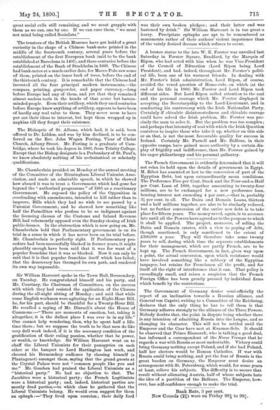A bronze statue to the late W. E. Forster was
unveiled last Saturday in Forster Square, Bradford, by the Marquis of Ripon, who had acted with him when he was Vice-President of the Council of Education (Lord Ripon being Lord President), and had, indeed, throughout Mr. Forster's politi- cal life, been one of his warmest friends. In dealing with Mr. Forster's Irish administration, Lord Ripon, of course, avoided the vexed question of Home-rule, on which (at the end of his life in 1886) Mr. Forster and Lord Ripon took different sides. But Lord Ripon called attention to the zeal and the personal courage which Mr. Forster displayed in accepting the Secretaryship to the Lord-Lieutenant, and in conducting his controversy with the Irish Nationalist Party. Certainly if chivalric disinterestedness and chivalric courage could have solved the Irish problem, Mr. Forster was pre- cisely the man to solve it. But the problem was too complex; and perhaps that intensity of zeal with which the Irish Question contrives to inspire those who take it up, whether on this side or on that, is not the most favourable quality for success in Ireland. Certainly Mr. Parnell and Mr. Balfour, in their opposite camps, have gained more authority by a certain dis- play of frigidity and indifference, than Mr. Forster gained by his eager philanthropy and his personal gallantry.


































 Previous page
Previous page